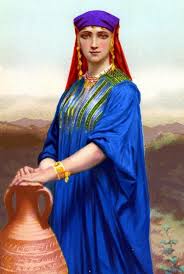Bethuel Became the Father of Rebekah
22: 20-24
Bethuel became the Father of Rebekah DIG: What news does Abraham receive about his extended family after he returned from Mount Moriah? What does this tell him about God’s provision? What is the purpose of Rebekah being mentioned here?
REFLECT: Who in your family has been blessed because of your relationship with ADONAI? What earthly “homeland” have you truly left so that you can enjoy the Lord’s promises to you?
Some time later, after the testing of Avraham, he was told: Milcah is also a mother; she has borne many sons to your brother Nahor (22:20). About sixty years had passed since Abraham had received any news about his family back in Mesopotamia. Abraham’s brother Nahor still lived there, possibly in a city that bore his name. Avraham often wondered where he could find a wife for his son. If Isaac was to be the father of a great nation as promised, the choice of a proper wife was very important. There seemed to be no candidate among their neighbors, the Amorites and the Hittites, and Abraham longed for Isaac to have a bride from his own people. But now, somehow hearing about his brother must have given Avraham hope. Nahor had twelve sons and he probably also had daughters whose names are not mentioned. God had surely blessed Abraham’s brother because of him. Surely somewhere in his extended family he could find a suitable wife for Isaac.370
Uz the firstborn (10:23, 36:28) founded the land of Uz where Job lived (Job 1:1), and the kings of Uz are mentioned in Jeremiah 25:20 and Lamentations 4:21. Secondly, Buz was his brother (Jer 25:23). The territory by that name was the home of Elihu in Job 32:2 and 6. The third son was Kemuel, the father of Aram (22:21 and 10:22). The fourth son was named Kesed, or in Hebrew, Chesed, who was the ancestor of the Chaldeans of Lower Mesopotamia (Job1:17). Other sons were Hazo, Pildash, Jidlaph and Bethuel (22:22).

Because Isaac was born so late in Abraham’s life, he was more the age of Nahor’s grandchildren than of his own cousins. The grandchildren of Nahor may have been very numerous, but only two are mentioned, Aram, son of Kemuel, and Rebekah, the daughter of Nahor’s youngest son, Bethuel.371 This entire genealogy is written only for the sake of introducing Rebekah, who would become the chosen wife of Isaac. Abraham was thus informed that there was now a possible wife for Isaac in his own family and he would not need to marry a Canaanite woman. This sets the stage for the events of Chapter 24, when Isaac must find a bride. Bethuel was also the father of Laban, who was Rebekah’s brother (24:29). Bethuel became the father of Rebekah. Milcah, who was Nahor’s niece, bore him eight sons, and his concubine, whose name was Reumah, also had the last four sons named Tebah, Gaham, Tahash and Maacah (22:23-24). The twelve Aramean tribes are named after these sons.
This genealogy introduces us to Rebekah, and also serves as a transition to Chapter 23, which records Sarah’s death and burial. In burying Sarah in Canaan, Abraham ignored his ancestry by not taking her back to Ur of the Chaldeans. He had truly left his homeland behind, and now viewed Canaan as his new native land.
Haftarah vaYera: M’lakhim Bet (Second Kings) 4:1-37 (A) 4:1-23 (S)
(see my commentary on Deuteronomy, to see link click Af – Parashah)
Sold into slavery (Second Kings 4:1-7) or brought back from the dead (Second Kings 4:8-37) – this Haftarah describes children who were redeemed. In the first episode, a woman begs Elisha to save her children from a creditor who had come to take her two children as his slaves in the corrupt court of Ahab and Jezebel. She fears that her children will learn corrupt ways, not walking in the God-fearing ways of their dead father. The Talmud teaches, “He who has raised a son like himself is not regarded as dead (Baba Kamma 116). The second episode closely mirrors the Torah portion. Here, a Shunammite woman is granted a miracle son (when she is too old to bear). Later, the son dies unexpectedly. Elisha breathes life into the dead child, who then gets off his death bed – a miracle of life from the the dead.
B’rit Chadashah suggested readings for Parashah vaYera:
Luke 17:26-37; Romans 9:6-9; Galatians 4:21-31; Messianic Jews (Hebrews) 6:13-20, 11:13-19; James 2:14-24; Second Kefa (Peter) 2:4-10
An angel of ADONAI appeared in a dream and announced to Joseph the miracle birth of a son (Matthew 1:20-21; Genesis 17:15-17, 18:10). This news is announced to Mary as well (Luke 1:30; Genesis 18:14-15). As commanded, the couple names the child Yeshua, meaning ADONAI saves, signifying the child’s predestined purpose (Matthew 1:21; Luke 1:31; Genesis 17:21 and 21:1-6). His destiny includes restoring David’s dynasty and establishing a Kingdom without end (Amos 9:11; Luke 1:32-33; Acts 15:16-18). The book of Luke ends as dramatically as it begins. Yeshua appears among some disciples telling them not to fear (Luke 24:36:39). Post-resurrection appearances signal the quickening of “life from the dead” for mankind (First Corinthians 15:45-49). In this way, Yeshua rises up children like Himself (Isaiah 53:10) – starting with His disciples who rejoice daily in the Temple and praise God for the gift of eternal life (Luke 24:53).



Leave A Comment